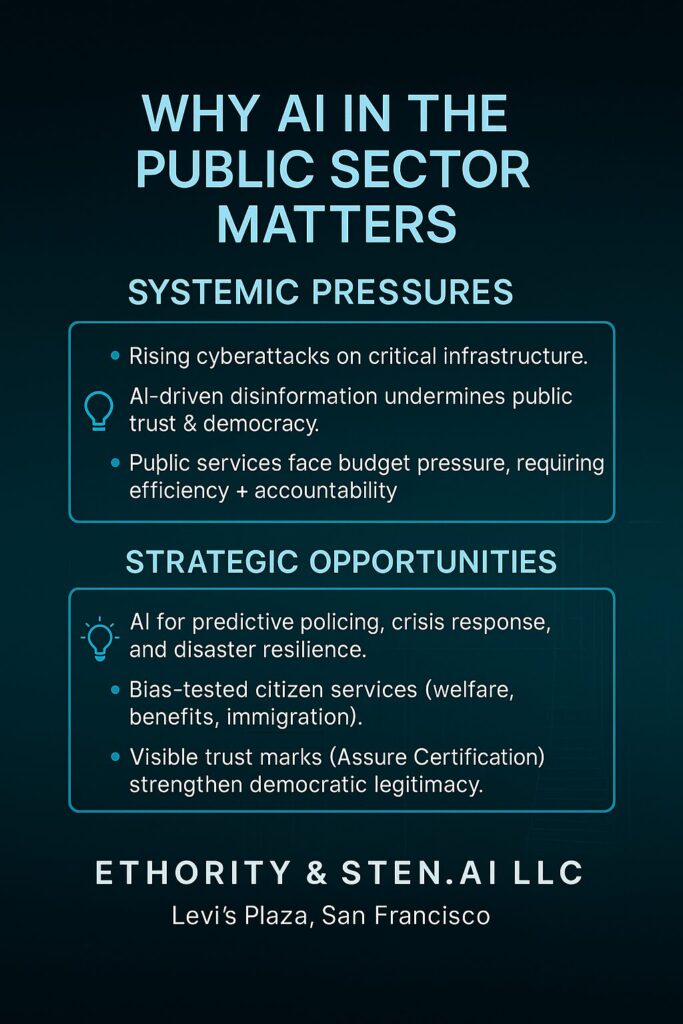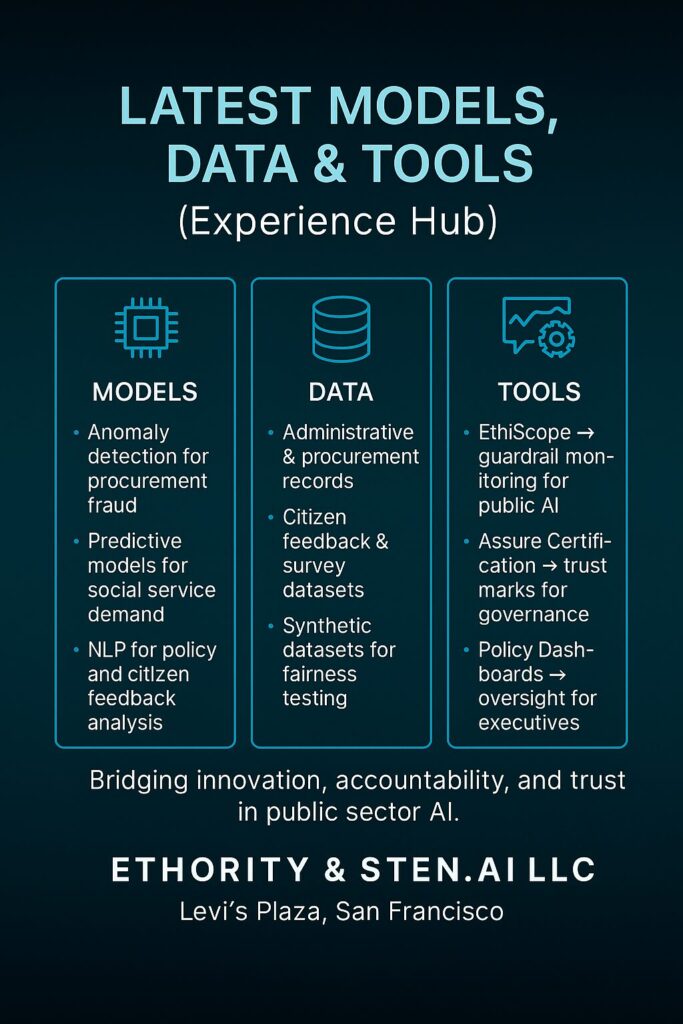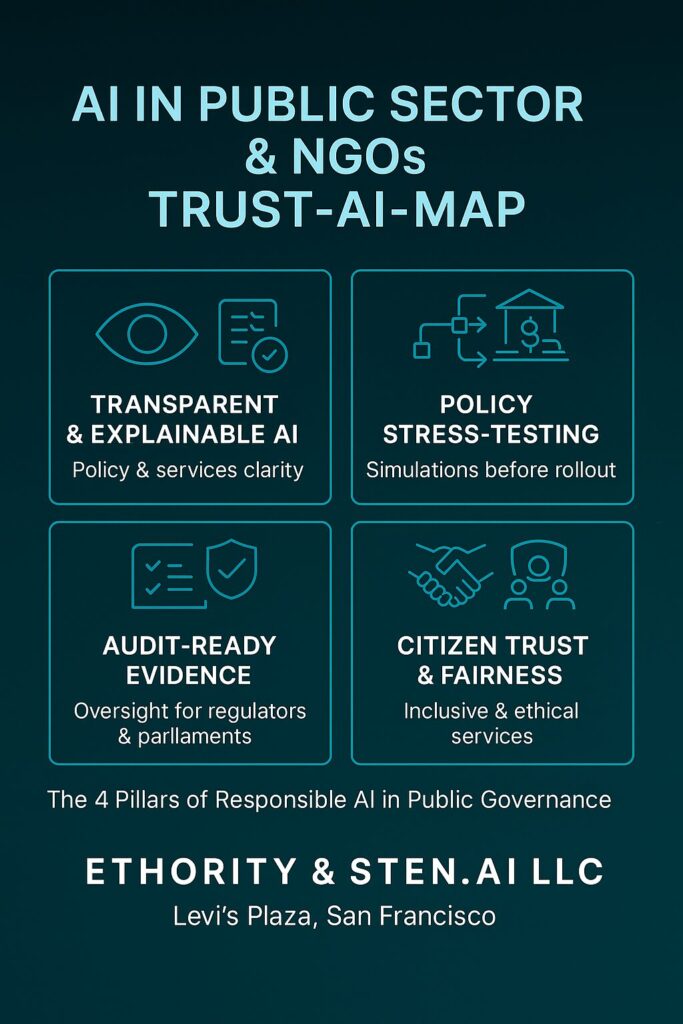AI in Public Sector & NGOs
By 2030, 80% of governments will deploy AI for public administration (OECD foresight). From tax compliance to social benefits, AI shapes citizen interactions daily. NGOs also rely on AI for humanitarian relief, crisis response, and climate action.
But without trust, these systems risk public backlash. Citizens demand fairness, transparency, and accountability. ETHORITY ensures AI in governance is explainable and compliant, embedding AI-1st OS frameworks and OrgTwin™ simulations to align policy with public trust.
Why AI in Public Sector & NGOs Matters
Systemic Pressures
Rising cybersecurity threats and misinformation undermine citizen trust.
Algorithmic bias in public services can deepen inequality.
Regulatory frameworks (EU AI Act, UNESCO AI Ethics) demand transparency and fairness in civic AI.
Strategic Opportunities
OrgTwin™ policy simulations → test laws, budgets, and social programs before rollout.
Transparent AI audits → strengthen legitimacy of public institutions.
AI-1st OS governance layers → unify compliance, oversight, and stakeholder alignment across agencies.

Facts & Research (2025–2030)
AI-enabled digital government services to reach 75% of EU citizens by 2030
OECD AI Policy Observatory
OECD data forecasts that by 2030, three out of four EU citizens will use AI-driven public services. The report highlights the transformation of citizen interactions through predictive analytics, adaptive service delivery, and AI-assisted policy planning.AI in law enforcement, social scoring, and welfare allocation classified as high-risk under the EU AI Act
European Commission – EU AI Act
The EU AI Act establishes mandatory compliance for AI systems that directly impact citizens’ rights and freedoms. These include risk classification, documentation, and human oversight to ensure lawful and ethical AI deployment in public institutions.Transparency and explainability emerge as top priorities in public sector AI adoption
UNESCO Recommendation on the Ethics of Artificial Intelligence
UNESCO’s framework identifies transparency, explainability, and human accountability as the ethical pillars for AI in governance. These principles guide public administrations in developing systems that are interpretable and auditable by design.NGOs increasingly use AI for humanitarian mapping and crisis response — but face bias and privacy risks
World Economic Forum – AI for Humanitarian Action
The World Economic Forum reports rapid AI adoption in humanitarian organizations, enabling real-time crisis coordination. However, data bias, lack of equitable datasets, and weak privacy protocols remain key barriers to responsible deployment.Governments are expected to invest heavily in AI trust frameworks and simulation platforms by 2030
McKinsey – AI and Government Foresight
McKinsey anticipates exponential growth in national investments focused on AI oversight, ethical sandboxes, and digital twin simulations. These systems aim to enhance regulatory foresight, accountability, and citizen confidence in AI-driven governance.
Analysis: AI Use Cases & Compliance
Key Use Cases
OrgTwin™ Policy Simulation → model the social and economic impact of new policies.
AI-1st OS Governance → unify compliance across agencies and departments.
Citizen Services AI → ethical chatbots, digital ID, benefit systems with fairness controls.
Crisis & Climate Response AI → NGO data-driven planning tools.
Audit Dashboards → real-time oversight for parliaments, ministries, and NGOs.
Compliance Landscape
EU AI Act → bans social scoring, enforces fairness & transparency in public sector AI.
UNESCO AI Ethics Framework → global fairness, accountability standards.
OECD Principles → inclusivity, robustness, accountability.
Challenges
Risk of algorithmic discrimination in benefits allocation.
Citizens’ low trust in opaque algorithms.
Fragmented governance across agencies.
Integration: ETHORITY’s Role
ETHORITY delivers governance-first AI solutions for governments and NGOs:
Platforms → OrgTwin™ for policy simulation, Assure Certification for trust.
Governance-by-Design → audit trails, public transparency dashboards, ethical guardrails.
We help institutions earn trust while innovating, ensuring compliance with EU AI Act and global ethics standards.
Latest Models, Data & Tools (Experience Hub)
Models: system dynamics for public policy, fairness metrics models, NLP for civic services.
Data: administrative records, NGO relief datasets, crisis mapping inputs.
Tools:
OrgTwin™ → simulate & stress-test policy.
Assure Certification → visible compliance trust marks.
Navigator Console → decision cockpit for leaders.

Outcomes for Public Sector Clients
Transparent, explainable AI in governance.
Policy tested before rollout, reducing systemic risk.
Audit-ready evidence for regulators and parliaments.
Citizen trust restored via visible compliance and fairness.

Why ETHORITY for Public Sector & NGOs?
End-to-End Lifecycle Coverage
From AI readiness assessments and ethical governance frameworks to OrgTwin simulations and Assure Certification, ETHORITY supports governments and NGOs across the full AI journey.
Compliance by Design
We embed the EU AI Act, UNESCO AI Ethics, and OECD public governance standards into every solution, ensuring public AI systems are transparent, fair, and accountable.
Ethics at the Core
Our approach prioritizes fairness, inclusivity, and explainability — reducing bias in citizen services, strengthening oversight, and ensuring AI protects democratic values.
Trust as Public Value
With OrgTwin policy simulations and visible Assure Certification trust marks, institutions can test policies before rollout, prove compliance, and earn lasting citizen trust.
TrustAI Insights: Unveiling the Depths of Ethical AI
Dive deep into the dynamic realm of ethical AI with ETHORITY’s blog, TrustAI Insights. Stay ahead of the curve with our expert analyses, latest trends, and innovative breakthroughs. Our blog serves as a beacon for thought leadership, offering in-depth articles that explore the intricacies and evolving challenges of ethical AI. Experience the forefront of AI discourse and discover how ethical considerations are shaping the technology landscape. Read Our Latest Articles and become part of the conversation defining the future of AI.






